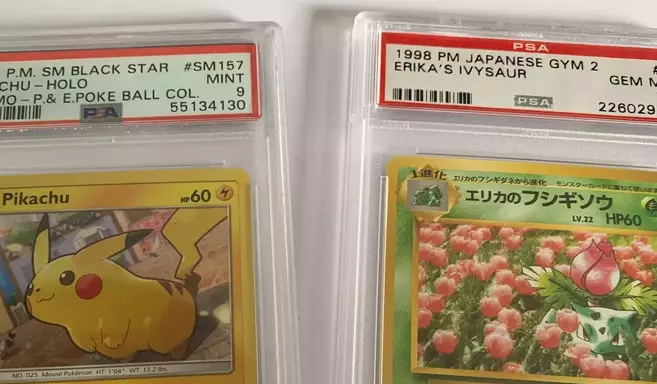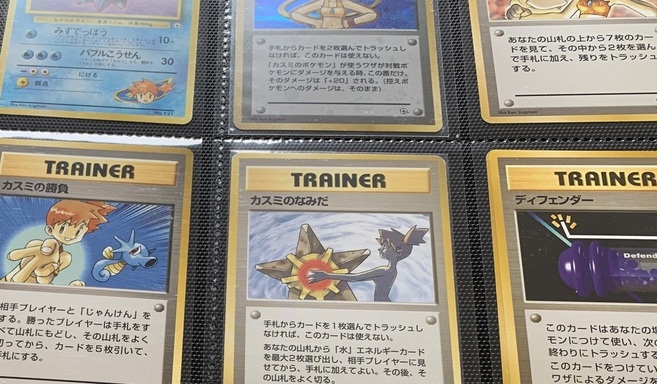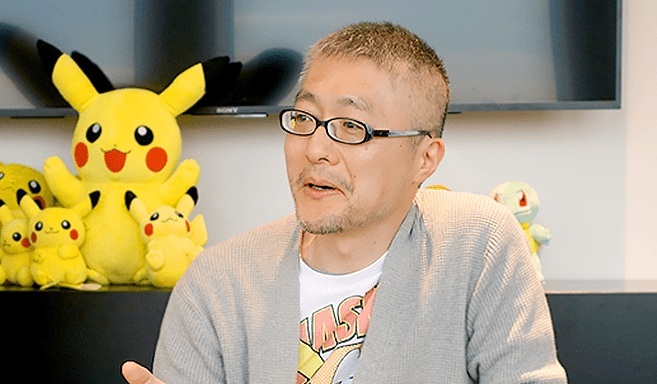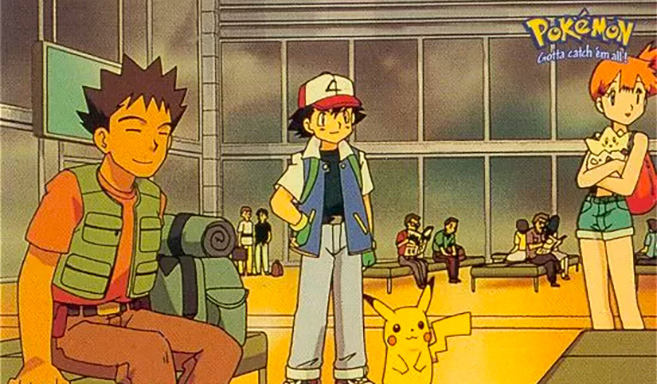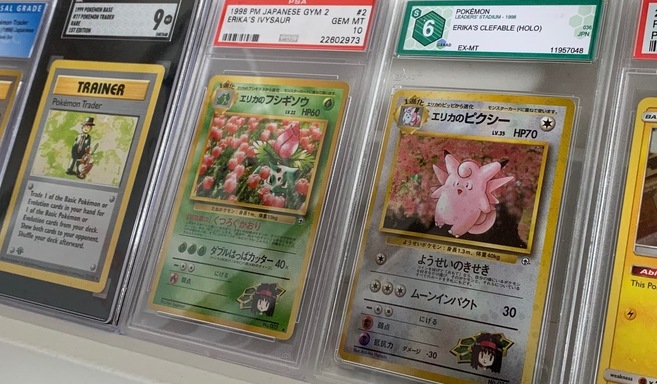Get the most out of your Pokémon card collection by learning the ins and outs of card grading
Pokémon cards have been a popular collectible for decades, and their value has skyrocketed in recent years. To maximize the worth of your collection, it’s essential to understand how grading works, which companies to trust, and the pros and cons of each. In a previous article we wrote about how to grade your Pokemon cards. While you could read all about the processes of grading in that article, in today’s comprehensive guide will cover the top grading companies in the USA and Europe, as well as the process, waiting time, and potential increase in value when a card is graded.
PSA (Professional Sports Authenticator) – USA
Labeling and Grading: PSA is a renowned grading company based in the United States, specializing in grading and authenticating sports cards, trading cards, and other collectibles, including Pokémon cards. Established in 1991, PSA has built a strong reputation within the collectibles community for its strict and consistent grading standards.
The PSA grading scale ranges from 1 (Poor) to 10 (Gem Mint), with each grade reflecting a card’s overall condition. PSA’s labels are both informative and secure, displaying the card’s grade, description, and a unique serial number. These labels are tamper-evident, ensuring that the card remains in its original graded condition while protected in a clear, sonically sealed case.
PSA also offers additional services such as card authentication, which verifies the legitimacy of the card before grading. This can be particularly valuable for rare and high-value cards to ensure their genuineness. PSA’s online database, the PSA Set Registry, allows collectors to showcase their graded collections, compete with other collectors, and track the performance of their cards in the market.
While PSA is often considered the gold standard in card grading, it’s worth noting that their services can come with a premium cost and longer waiting times due to high demand. Nevertheless, many collectors and investors consider the investment in PSA grading to be worthwhile, as it can significantly enhance a card’s value and desirability in the market.
Pros: PSA is considered the gold standard in card grading and authentication. They have a reputation for strict and consistent grading, which can lead to higher resale value.
Cons: The cost of grading with PSA can be higher than other companies, and the waiting time is often longer due to high demand.
Waiting Time: The turnaround time for PSA can vary from a few weeks to several months, depending on the service level chosen.
Cost: Prices range from $20 to $200 per card, depending on the card’s value and turnaround time desired.

See the grading services of PSA.
Beckett Grading Services (BGS) – USA
Labeling and Grading: Beckett Grading Services, founded in 1999, is a well-established grading company based in the United States. Specializing in grading sports cards, trading cards, and other collectibles, including Pokémon cards, BGS has earned a reputation for its thorough grading process and reliable services.
BGS employs a 10-point grading scale, similar to PSA, ranging from 1 (Poor) to 10 (Pristine). What sets BGS apart from other grading companies is its unique sub-grade system. BGS provides sub-grades for four aspects of a card’s condition: corners, edges, centering, and surface. These sub-grades offer more insight into a card’s overall condition, helping both buyers and sellers make more informed decisions.
The labels used by BGS display the card’s overall grade, sub-grades, description, and a unique serial number. Cards are encased in a tamper-evident, clear plastic holder to ensure protection and preserve the card’s condition.
Beckett Grading Services also offers a premium grading service called Beckett Black, which caters to high-value and elite collectibles, providing an exclusive label and expedited services.
While BGS’s grading scale may be perceived as less strict than PSA’s, their sub-grade system and consistent grading make them a popular choice among collectors. The turnaround times for BGS can vary from a few weeks to several months, depending on the chosen service level. Although BGS may not command the same premium as PSA, their thorough grading process and sub-grades provide valuable information that many collectors and investors appreciate.
Pros: BGS is known for their thorough grading process and the inclusion of sub-grades, which can be helpful for buyers and sellers to understand a card’s overall condition.
Cons: The BGS grading scale is perceived as less strict than PSA’s, which may affect resale value.
Waiting Time: Turnaround times for BGS can range from a few weeks to several months, depending on the service level chosen.
Cost: Prices range from $20 to $250 per card, depending on the card’s value and desired turnaround time.

See Beckett Grading service.
CGC (Certified Guaranty Company) – USA
Labeling and Grading: Established in 1999, CGC initially focused on grading comic books but has since expanded its services to include trading cards and other collectibles, including Pokémon cards. Although CGC is relatively new to the Pokémon card grading market, they have quickly become a popular choice for collectors due to their more affordable grading fees and faster turnaround times.
Similar to PSA and BGS, CGC uses a 10-point grading scale, with 1 (Poor) being the lowest and 10 (Gem Mint) being the highest. CGC also offers sub-grades for centering, corners, edges, and surface, providing detailed information about a card’s condition. This feature can be valuable for collectors who want a comprehensive assessment of their cards.
CGC’s labels are designed to be informative and secure, displaying the card’s grade, sub-grades, description, and a unique serial number. Cards are encased in a tamper-evident, clear plastic holder, ensuring protection and preserving the card’s condition.
One of the key advantages of choosing CGC for Pokémon card grading is their faster turnaround times compared to industry giants like PSA and BGS. CGC typically has a turnaround time of 3 to 6 weeks, depending on the service level chosen.
Although CGC’s reputation in Pokémon card grading is not as established as PSA or BGS, they have been successful in other collectible markets, such as comic books. This experience and expertise, combined with their competitive pricing and quicker turnaround times, make CGC an attractive option for collectors looking to grade their Pokémon cards.
Pros: CGC has a quicker turnaround time compared to PSA and BGS, and their grading fees are generally more affordable.
Cons: CGC is relatively new to Pokémon card grading, so their reputation is not as established as PSA or BGS.
Waiting Time: CGC typically has a turnaround time of 3 to 6 weeks, depending on the service level chosen.
Cost: Prices range from $8 to $100 per card, depending on the card’s value and desired turnaround time.

Go to CGC website.
SGC (Sportscards Guaranteed Grading – USA
Labeling and Grading: SCG (Sportscard Guaranty) Grading is a card grading company based in the United States that specializes in sports cards and other trading card collectibles, including Pokémon cards. Founded in 1998, SCG Grading has over two decades of experience in the industry, providing collectors and investors with an alternative to more prominent grading companies like PSA and BGS.
SCG Grading utilizes a 100-point grading scale, which offers more granularity than the traditional 10-point scale. The grades range from 10 (Poor) to 100 (Gem Mint), allowing for a more precise evaluation of a card’s condition. This nuanced grading scale can be beneficial to collectors seeking a more detailed assessment of their cards.
The labels used by SCG Grading display the card’s grade, description, and a unique serial number. Cards are encased in tamper-evident, clear plastic holders designed to protect and preserve the card’s condition.
One of the advantages of choosing SCG Grading is their competitive pricing and quicker turnaround times compared to some of the larger grading companies. SCG Grading strives to provide an efficient and affordable grading service while maintaining high standards for card evaluation.
While SCG Grading may not have the same global recognition as PSA or BGS, their experience, unique 100-point grading scale, and commitment to providing affordable and efficient services make them an attractive option for collectors looking to grade their Pokémon cards. Collectors should, however, be aware that SCG Graded cards might not command the same premium as those graded by more established companies in the market.
Pro: SCG Grading offers a unique 100-point grading scale, providing a more nuanced evaluation of a card’s condition. They also have competitive pricing and quicker turnaround times compared to some larger grading companies.
Cons: SCG Grading does not have the same global recognition and market premium as companies like PSA and BGS. As a result, cards graded by SCG may not command the same premium as those graded by more established companies.
Waiting time: SCG Grading generally offers faster turnaround times compared to some larger grading companies. The waiting time can vary depending on the service level chosen, but their standard service typically takes around 3 to 6 weeks.
Cost: SCG Grading’s pricing can vary depending on the service level chosen, card value, and turnaround time. For the most accurate and up-to-date pricing information, it is recommended to visit their website or contact them directly.

Visit SGC website.
Value Increase When a Card is Graded
Grading your Pokémon cards can significantly increase their value. The process of grading not only authenticates the card but also provides an accurate assessment of its condition. A high-grade card (9 or 10) can sell for substantially more than an ungraded card, as collectors often seek out the best condition cards to add to their collection.
However, it’s important to note that not all cards will see a significant increase in value when graded. Cards with lower grades (e.g., 1 to 6) may not experience the same price increase as those with higher grades. Additionally, common cards, even in high grades, may not see a substantial increase in value due to their abundance in the market.
Conclusion
Grading your Pokémon cards is an important step in maximizing their value and ensuring their authenticity. Each grading company has its pros and cons, so it’s essential to consider factors like reputation, cost, and waiting time when choosing the right company for your needs. By understanding the grading process and selecting the best grading company, you can help protect your investment and potentially increase the value of your Pokémon card collection.
FAQ
Grading Pokémon cards authenticates them and provides an accurate assessment of their condition. This can increase their value, making them more appealing to collectors.
Most grading companies use a 10-point grading scale, with 1 being the lowest and 10 being the highest. Higher grades indicate better card condition and often result in higher resale value.
PSA (Professional Sports Authenticator) is often considered the gold standard for Pokémon card grading due to their strict and consistent grading standards.
BGS offers a thorough grading process and provides sub-grades for corners, edges, centering, and surface, giving more detail about a card’s condition.
CGC typically has a quicker turnaround time and more affordable grading fees compared to PSA and BGS. However, their reputation is not as established in the Pokémon card grading market.
Grading can significantly increase the value of a Pokémon card, particularly for cards with high grades (9 or 10). Collectors often seek out high-grade cards, which can lead to higher resale value.
Not necessarily. Cards with lower grades and common cards, even in high grades, may not experience a significant increase in value due to their condition or abundance in the market.
Waiting times for grading can vary depending on the company and service level chosen. Turnaround times can range from a few weeks to several months.
The cost of grading varies depending on the company, the card’s value, and the desired turnaround time. Prices can range from $20 to $250 per card.


